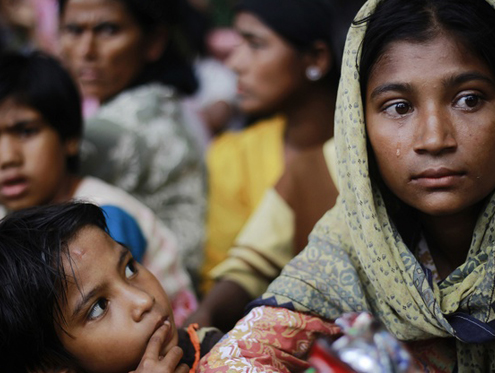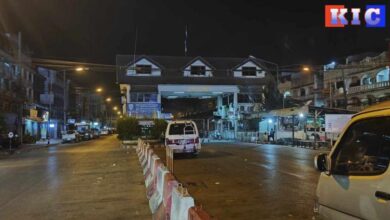Human Rights Group Condemns Burma Government Draft Plan on Rohingya

An international human rights organisation has warned that a draft plan by the Burma government to tackle violence in Rakhine State would entrench discrimination and be counterproductive to peace.
Human Rights Watch said in a statement that the government’s draft plan failed to recognise the term ‘Rohingya,’ instead referring to ‘Bengalis.’
HRW said that this was “an inaccurate and derogatory term commonly used by Burmese officials and nationalist Buddhists. Muslims are only mentioned in the plan with reference to religious schools.”
The draft plan, which is meant to solve the ‘Rohingya question’, discusses issues ranging from Rule of Law, Security and Construction to the ‘Citizenship Assesment of Bengalis’ and ‘Permanent Resettlement,’ of the 130,000 Rohingya displaced by violence, and who now reside in basic camps. The plan does not specify where the internally displaced will go when they are resettled, and does not mention whether people can return to their homes, HRW said.
The government’s plan has scheduled the resettlement of the entire displaced Rohingya population for April and May 2015, just ahead of Burma’s annual monsoon season. In preparation, residences, schools, community facilities, and necessary road, electrical, and water and sanitation infrastructure would be constructed by next April.
Mr Phil Robertson, Human Rights Watch’s deputy Asia director said the plans outlined by the government were an attack on fundamental human rights.
“The long-awaited Rakhine State Action Plan both expands and solidifies the discriminatory and abusive Burmese government policies that underpin the decades-long persecution of the Rohingya,” Mr Robertson said, adding, “It is nothing less than a blueprint for permanent segregation and statelessness that appears designed to strip the Rohingya of hope and force them to flee the country.”
Mr. Robertson said the plan would effectively segregate the Rohingya on a permanent basis. “The Burmese government’s plan proposes segregation measures that have been advocated by extremists… Moving the Rohingya further from urban areas to isolated rural camps will violate their basic rights, make them dependent on outside assistance, and formalize the land grab of Rohingya property.”
HRW estimated that since violence first started in June 2012, 140,000 Rohingya have become internally displaced and are now living in makeshift camps in Rakhine State, with a further 40,000 living in isolated communities with little outside assistance.
The country’s census conducted with the assistance of the United Nations in April and March of this year also failed to recognise the Rohingya as a minority of Burma.
The United Nations Population Fund (UNFPA), the UN agency tasked with assisting the Burma Government in conducting the census, said it was “deeply concerned” about the exclusion of the Rohingya. The UNFPA said at the time that the census was a, “departure from international census standards, human rights principles and agreed procedures.”
U.N. Secretary-General Ban Ki-moon has expressed growing alarm at the human rights situation in Rakhine State.
In his third annual report to the General Assembly’s Third Committee, Mr. Ban said that, “The situation in Rakhine state continues to cause widespread concern and alarm both domestically and internationally.”
“While the government of Myanmar has repeatedly made strong statements of actions to be taken against perpetrators of violence, these have not been conveyed with sufficient firmness to the local level,” the report, presented by Mr. Ban, stated.
Burma’s 1982 citizenship law fails to recognise Rohingya as citizens, effectively making 800,000 people stateless in Burma, the UN has estimated.
Mr. Robertson criticised the government and called on the international community to condemn what he deemed a racist plan.
“It is shocking that a government that claims to be reform-minded has proposed bigoted policies,” said Mr. Robertson, “International donors and concerned governments should not delude themselves that this plan will lead to the Rohingya’s integration with citizenship into Arakan State… Those concerned about human rights in Burma should stand firm and demand changes to the citizenship law to protect the fundamental rights and freedoms of the Rohingya.”




